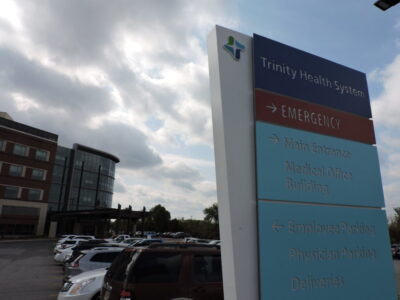Local Experts Discuss Effects Of Trade Tariffs
Wheeling Chamber Hosts Economic Outlook Conference

Photo by Joselyn King David H. McKinley, president and chief investment officer and McKinley-Carter Wealth Services, speaks during the annual “Economic Outlook Conference” at the Wheeling Island Hotel-Casino-Racetrack Wednesday morning organized by the Wheeling Area Chamber of Commerce.
WHEELING — Local economic experts suspect trade tariffs imposed by the Trump administration last spring won’t have a long-term negative effect on inflation and prices paid at the supermarket.
The Wheeling Area Chamber of Commerce hosted its annual Economic Outlook Conference at the Wheeling Island Hotel-Casino-Racetrack on Wednesday morning. Speakers included David H. McKinley, president and chief investment officer and McKinley-Carter Wealth Services; and John Deskins, assistant dean and director of the Bureau of Business and Economic Research at the West Virginia University College of Business and Economics.
McKinley pointed out to those present that tariff rates rose dramatically to 30% in April 2025 following action by the Trump administration. The rate is now at 19%.
“These tariffs, they are an issue,” he said.
“I’m not exactly sure what the administration’s plan is. I would like to believe the intent is to do away with tariffs both ways, then we can resume free trade. But I am not sure.
“This isn’t a political talk, but I’m hopeful that we can just resume free trade with all these thriving economies around the world.”
McKinley noted China has an emerging middle class, as does India. Both countries have populations of more than 1.4 billion people.
“We want to transact with those economies,” he continued. “The idea that we are creating barriers to that is concerning to me.”
Deskins said economics experts were worried about inflation rising as a result of the tariffs, but he thinks any increases will be temporary.
“Inflation was pretty much under control this time last year,” Deskins said. “Inflation has moved up a little bit already, and we expect inflation to get back to a high of about 4% over the next year. That is going to be because of the tariffs.
“But the tariff impact on inflation will be a one-time thing,” he added. “Prices will go up because of the tariffs, and that will be it. We will get back to a regular rate of inflation. The tariffs aren’t going to create a persistent rate of inflation in which prices go up, up, up all the time. It will be a one-time jump, and then we can expect to get back to that normal 2% rate of inflation that we hope for by 2027.”
Experts had been worried about “real big problems with inflation back in April,” he continued.
“Right now, we think we’re going to have this transitory jump back up to 4%, then over a two-year period a drop to 2% back to where we want to be,” he said. “It’s not a concern, except for this spike that’s coming that’s going to be temporary.”
There were other points of interest raised during the discussion.
Deskins noted how West Virginia once again leads the nation not in unemployment, but in the number of West Virginians eligible to work who are not participating in the work force. Overall West Virginia’s overall unemployment rate sits at just below 4%, while 4.5% is thought by economists to be a “natural rate,” according to Deskins. The national rate is 4.3%.
But Deskins pointed out the difference between an unemployment rate and a labor force participation rate.
“Remember, the unemployment rate is about how many people have a job and how many are looking,” he said. “Labor force participation … captures among the adult population those who want to work in the first place. This is where West Virginia comes in dead last.”
The state has now fallen below Mississippi to be 50th among the 50 states in labor force participation, he reported.
“This is our biggest economic challenge, and this is tied to all problems we have in our state,” Deskins said. “We are never going to achieve the level of prosperity we hope for in our state unless we get more people in the workforce.
“It is virtually mathematically impossible for West Virginia to enjoy something like per capita personal income that is on par with the national average if we are dead last in terms of a population that is working or looking for work,” he added.
The state’s economic strategies have to focus on this statistic, he said.
McKinley, meanwhile, provided statistics showing the year 2024-25 to be a good economic year.
“And the reality is 2025-26 looks even better than 2024-25,” he explained. “Although the economy appears to be growing slower than it had been, profitability appears to be rising. Things look pretty darn attractive, and it is going to get better.”
McKinley noted it would be prudent to pay special attention to small tech stocks, especially those found in West Virginia.
“The reality is, the best returns you can get are in your hometown,” he told those present. “Investing in real estate, businesses – if you have never considered such, please do. There are so many opportunities.
“There is a tailwind behind us globally and nationally, but pay attention to what is happening in the state and locally. I think there are some real opportunities,” McKinley said.




